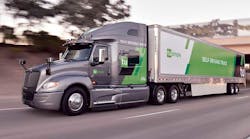The government wants to know how the trucking industry would like to proceed with autonomous technology for over-the-road commercial freight as it seeks to streamline how conventional fleets would welcome self-driving trucks.
Regulators are seeking input from fleet managers, drivers, engineers and others on how autonomous driving systems “should be integrated into fleet operations with conventional trucks for mixed-fleet operations,” according to a notice published in the Federal Register on Nov. 3. The industry input would be gathered by questionnaires before and after four autonomous truck technology roadshows in 2021.
The Federal Motor Carrier Safety Administration (FMCSA) is seeking comments on its proposed collection project, “Trucking Fleet Concepts of Operations (CONOPS) for Managing Mixed Fleets.” The project’s goal is to survey some 2,000 people in the trucking industry “to collect baseline opinions of automated driving systems (ADS) before and after hands-on demonstrations with ADS technologies.”
“Reflecting this issue is a question frequently asked by trucking executives: ‘How can I integrate ADS into my fleet operations?’” the government writes in the Federal Register notice. “FMCSA needs information from truck industry representatives regarding their opinions and perception of ADS.”
During the American Trucking Associations’ (ATA) virtual Management Conference and Exhibition on Oct. 23, FMCSA’s Deputy Administrator Wiley Deck pointed out that the agency is looking to study automated driving systems (ADS).
“The intent is not to direct what type of technology that industry should use; we want to be technology-neutral,” Deck explained.
“It’s coming. It’s happening,” Deck added. “We want to ensure that those vehicles are operating in a safe manner and that our law enforcement partners know what to do when they come across an automated truck.”
Early in 2020, the U.S. Department of Transportation released its AV 4.0 report, which showed a roadmap to unifying automated vehicle efforts across 38 federal departments, independent agencies and commissions so the federal government could guide state and other local agencies.
The automated truck is expected to “profoundly affect all commerce in the U.S., as the U.S. moves more than 70% of all goods by truck,” the Nov. 3 notice reads. “However, existing stakeholders in the road freight ecosystem (primarily for-hire and private truck fleets, but also shippers, brokers, truck manufacturers, and service and maintenance providers) do not have a clear picture of how they will implement ADS in their daily operations.”
While still new, self-driving truck development is progressing faster than many fleets can keep up with and plan for, according to FMCSA. The administration warns that this pace could “adversely affect adoption by truck fleets and associated industries,” which would delay an automated truck freight network’s promising benefits. The nascent technology’s touted benefits include added safety, productivity, and efficiency.
“If ADS technology is to gain traction in the U.S. trucking industry, current stakeholders and new entrants need a rigorous, data-driven CONOPS,” according to FMCSA.
The administration wants to focus the CONOPS ADS project on the development of automated trucks that “translate directly to real-world settings that are of practical importance to the trucking industry, regulators and the public at large.”
To do this, the government wants to create a series of outreach events for commercial drivers and fleet managers to meet ADS technology developers and OEMs. “The outreach will also provide opportunities to participate in hands-on technology demonstrations, such as in-vehicle demonstrations and closed-course scenarios,” according to the FMCSA notice. “Lessons learned from this demonstration will influence all three phases of the research to ensure the CONOPS developed is true to real-life fleet operations.”
Those three phases are:
Expose truck fleet managers and other personnel, truck drivers, government officials, insurance and inspection personnel, and the general public to ADS;
Collect valuable qualitative data on participants’ opinions and perceptions regarding ADS;
Use the data to ensure the CONOPS covers significant industry concerns.
FMCSA plans four roadshows to collect some of this data from commercial drivers, fleet managers, industry engineers, commercial vehicle salespeople, researchers, state and federal government officials, insurance and inspection personnel, and the general public. The roadshows would coincide with large industry conferences, such as the Technology Maintenance Council (TMC) annual meeting, North American Commercial Vehicle Show, SAE COMVEC, and Automated Vehicle Symposium.
Initial data, however, would be collected by a mobile app questionnaire during Phase I of the study to create a baseline of opinions on ADS technologies before embarking on the roadshows. The roadshows would be part of Phase II, in which the FMCSA would attempt to see if participants’ opinions change after hands-on demonstrations with ADS tech. The pre-roadshow and post-roadshow questionnaires are expected to take between three and five minutes, according to an FMCSA pilot test completed earlier this year.




